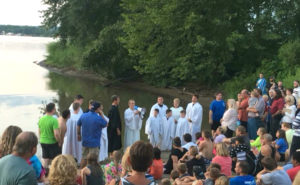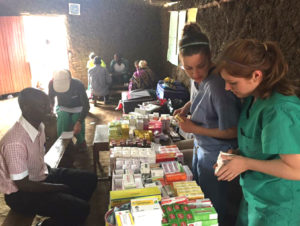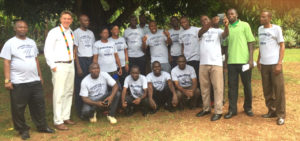 [1]
[1]
Foster care, health care, soul care, and developing leaders. First Baptist Church of Kenova, West Virginia, specializes in all four at each of its three campuses, undergirded by a strong evangelistic thrust.
Steve Willis, called in 2004 to First Kenova as his first lead pastorate, says, “We’re just trying to identify, recruit, and train people who have a heart for God and Appalachia.”
In addition to growing from 220 to 700 in the last few years, First Kenova has sent more than one hundred people to plant a collegiate church at nearby Marshall University in Huntington, West Virginia, and helped revitalize the neighboring First Baptist Church of Ashland, Kentucky.
“We’re not trying to build a single church of one thousand people,” Willis said. “Every time we fill up our sanctuary, we send out people to help lead another congregation.”
All three campuses together see nearly nine hundred people in Sunday morning worship, with fifty baptisms in 2018. Willis credits the growth to the church allowing its pastors to concentrate on the Word of God and prayer, and the support staff and lay members ministering effectively in other areas that usually bog pastors down.
Willis returned to his home state of West Virginia after graduating in 1996 from Dallas Theological Seminary. With a heart already burdened for Appalachia, during his first year of seminary he learned that out of over four hundred graduates from Dallas and Southwestern seminaries that year, not even one went to serve in the Mountain State. Not much has changed in twenty years.
“I had a friend in Africa who once led seminary training for the IMB,” Willis recently told SBC LIFE. “He had more guys willing to move to Africa than we had willing to move to West Virginia. Our state is a mission field of its own.”
Opioid Issue
Though half his time is focused on Bible study and prayer, Willis still finds time to reach beyond his church’s walls. The area has the highest opioid overdose rate in the nation, which has a ripple effect on families and children, and the foster care system. To offset this, First Kenova provides clothing and furniture for families who take in foster children, as well as Christmas gifts for the youngsters in their communities.
“Families are in disarray and the foster care system is overwhelmed,” Willis lamented. “So we’ve decided to eliminate many of the roadblocks to taking in foster children. We’re supporting parents who are trying to take care of these kids who have been orphaned by the opioid crisis.”
The church also sponsors a Celebrate Recovery group and an outreach ministry to women working at local strip clubs, but members’ greatest efforts go toward preventive measures via weekly Bible study and sports ministries reaching more than three hundred children and teens.
Obesity Issue

After a good friend died too young because of unhealthy eating, and seeing his son’s learning ability improve significantly when his wife changed their dietary choices, Pastor Steve began to notice—and pray about—the unhealthy lifestyles of many people in the Huntington area.
He knew he needed to address it publicly but other church leaders advised caution. Potluck-loving Baptists wouldn’t appreciate a sermon on gluttony, the pastor was advised. He continued to pray, and finally was granted a blessing to proceed as long as he did it “with a feather and not a hammer.”
On the Friday before he planned to address the issue from the pulpit, the Center for Disease Control released a report designating his region as the unhealthiest in America with a whopping 46 percent of residents being obese.
“The news report was divinely timed,” Willis said. “If I would have delivered my sermon two months earlier, it would not have had the impact it did.” By the end of the sermon, sixty people came forward to commit to a healthier lifestyle. Within weeks, members of First Kenova had lost two tons of weight.
During the process, a member called the radio station K-Love to share how the church’s ministries were making a difference. Soon, other national news outlets picked up on the story, which led celebrity chef Jamie Oliver to come to town and teach residents how to cook and eat in a healthier manner. For six straight weeks the church was featured on prime-time television on ABC.
“I have to credit some of our growth to that,” Willis told SBC LIFE. “People started coming who wanted to be healthier, and we baptized a lot of them.”
The church’s transformation is chronicled in Willis’s book, Winning the Food Fight, as well as the New York Times’s bestselling book, The Daniel Plan, by Rick Warren, which includes a chapter written by Willis.
“It’s amazing that the Lord can start a national movement through one small-town church,” Willis said. “But with God, all things are possible.”
To this day, First Kenova’s Wednesday night suppers are as healthy and nutritious as they are tasty, the pastor said, and the entire region is significantly healthier than it was ten years ago. “We’re not even on the top ten list anymore,” Willis said. “Only God can do that.”
Missions

First Kenova increased their budgeted missions giving from 3 percent in 2004 to nearly 28 percent in 2018. This includes increasing their giving through the Cooperative Program from 0.2 percent to 4.5 percent of their undesignated receipts since 2009, and giving to international and North American missions through the Lottie Moon and Annie Armstrong offerings.
In addition, First Kenova tithes its pastor’s time. He is given five weeks a year to serve other ministries as he teaches at Baptist seminaries throughout the world.
The greatest change, however, has been the church’s involvement in outreach.
“They don’t just send me; they send each other,” Willis said. “Twenty years ago we didn’t have five people go out on mission trips. This year we’ll send one hundred.
“The number one thing we’re focusing on now is developing leaders,” the pastor continued. “We could be planting more churches, revitalizing dozens more, but we first need team-oriented, mission-minded pastors putting their hand to the plow and committing to the mission field that is Appalachia. It takes a few years to figure out the culture and get ‘in’ here, but once you’re ‘in’ you can really make a difference.”

Related story from Baptist Press: Who was the guy at the piano during the Bush funeral? [3]
